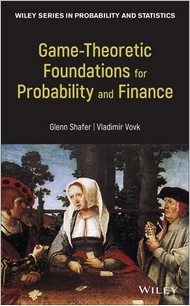Newsletter of the Bachelier Finance Society
Volume 15, Number 3, July 2023
12th BFS WORLD CONGRESS, RIO DE JANEIRO, 8-12 JULY 2024
The Scientific Committee has been formed and the plenary speakers will be announced soon.
JOB POSTINGS
The aim of these postings is to create a forum for the dissemination of information on academic and industrial positions related to mathematical finance, across different disciplines and different geographical regions. Please submit any job advertisements you are aware of to jobads@bachelierfinance.org, preferably in plain text and sending the link to the website containing all the information. Updates and new items appear continuously at: bachelierfinance.org/forum/jobs
Research Assistant Position
University of Freiburg
Deadline: July 31, 2023
Probationary (Tenure-track) position
Western University
Deadline: November 15, 2023
Visiting Researcher Position
NTU Singapore
BOOKS & JOURNALS
The Society maintains a list of books, book reviews and journals at: bachelierfinance.org/publications. Members who would like to have their books added to the website, should please let us know.
BOOK REVIEW
Game-theoretic foundations for probability and finance
by Glenn Shafer and Vladimir Vovk

reviewed by Ruodu Wang (University of Waterloo)
Department of Statistics and Actuarial Science, University of Waterloo, Canada. E-mail: wang@uwaterloo.ca
In this masterpiece, Glenn Shafer and Vladimir Vovk laid down the foundations of game-theoretical probability. This book is a well-thought and multi-dimensional upgrade of a previous book by the same authors ([3]).
For most scholars trained in measure-theoretic probability, including myself, the language of game-theoretical probability may be foreign. The familiar concepts to us – random variables, distributions, sigma algebras, and probability measures – are not needed for the framework of game-theoretic probability. Using original and innovative techniques and definitions in the book, the authors were, remarkably, able to prove celebrated results such as (versions of) the law of large numbers, the central limit theorem, the law of iterated logarithm, and the Itô-Doeblin formula.
Instead of probabilistic statements, the theory communicates through the strategy and the capital of a player, called Skeptic in a perfect-information game. Skeptic bets along with (or against) two other players, Forecaster and Reality, to gain or lose capital that cannot go negative. For instance, a version of the law of large numbers is stated as follows (a simplified version of Proposition 1.2): Skeptic, betting on realizations relative to \(0\), has a strategy that guarantees, for any sequence of realizations \((y_i)_{i\in \mathbb N}\subseteq [-1,1]\), that, as \(n\to\infty\), either (i) \( \sum_{i=1}^n y_i/n \to 0 \) or (ii) Skeptic’s capital grows to infinity. One needs to read Sections 1.1 and 1.2 to fully understand this result, but let me roughly explain. Here, \((y_i)_{i\in \mathbb N}\) serves the same purpose as our familiar objects “values of independent random variables,” and point (ii) serves the same purpose as our familiar statement “an event of probability \(0\) occurs.” Hence, a probabilistic analog of this result is “the sample mean of a bounded sequence converges to \(0\) almost surely”. Note, however, that no concepts of probability, distribution, expected value, or independence are needed for the above result; their corresponding roles are built into the design of protocols of the betting game.
Most probabilists and statisticians are, by training, equipped with measure-theoretic probability. Studying game-theoretic probability is not a trivial task, and it may be even uncomfortable in the beginning. For such a revolutionary theory, despite its mathematical beauty, one must wonder what values it brings to probability, statistics and finance. I briefly mention a few points below, but there is much more to it that I am not able to elaborate on.
For probability, as the authors mentioned, both the measure-theoretic and the game-theoretic approaches provide ways of making probability of the time of Bernoulli and Laplace rigorous in modern mathematics. Some results or principles may be easier to state, prove or understand via the measure-theoretic approach; others may be easier via the game-theoretic approach. Ample examples and contrasts are discussed throughout the book. Therefore, game-theoretic probability offers not only an innovative way of understanding probability, but also a venue to potentially explore new results on probability and its connection to game theory and decision theory. Moreover, game-theoretic probability does not rely on a pre-assigned probability space or the axioms of Kolmogorov, which may not be self-evident to some individuals.
The game-theoretic approach treated in this book has received increasing attention in the statistics and machine learning community. For instance, it is the main idea behind testing by betting ([2]), e-values ([4]), and martingales techniques in sequential testing, multiple testing, and confidence sequences (see the survey [1]). Especially over the past five years, research on these topics exploded and many applications arose. Although most of the recent methodological advances are written in the standard languages of probability and statistics as we know them, the core ideas are based on the game-theoretic approach.
Parts I-III of the book address the discrete-time theory. For finance, it is especially important to understand the continuous-time picture, which is studied in Part IV of the book. In this setting, the game-theoretic approach to finance naturally connects to continuous-time martingales and stochastic analysis, with which scholars in quantitative finance are the most familiar. Again, without assuming probability or sigma-algebras, the authors were able to derive many classic results in finance. For technical reasons, there is an emphasis on continuous paths, which, for the moment, excludes some popular models in quantitative finance; this gap may be addressed in the future.
The game-theoretic approach does not need to be detached from measure theory, and sometimes making use of both together can be very fruitful. For instance, the protocols can involve probability measures in Forecaster’s moves (i.e., probabilistic forecast); some of such protocols are studied in Chapters 10-12. Measurability and filtrations are needed in the continuous-time portion, Part IV, of the book. Both the measure-theoretic and the game-theoretic approaches are fully compatible with probability theory before the time of Kolmogorov. They formalize and generalize concepts in different ways, and many results can be translated between the two frameworks, as discussed in Chapter 9.
The theory is actively evolving, and it is not completely clear what it will offer in the future. In probability and finance, some areas in which the game-theoretic approach has led to innovations beyond the standard approach are discussed on pages xii-xiii of the book. In statistics and machine learning, the benefit of working with the game-theoretic approach is crystal clear; it has resulted in many ground-breaking statistical methodologies, and continues to generate more excitement almost every day.
In summary, if time and energy allow, I would recommend every scholar and student in probability, statistics, and quantitative finance to read the book, apply or advance its techniques, and enjoy the fascination of the world built by Shafer and Vovk.
References
[1] Ramdas, A., Grünwald, P., Vovk, V. and Shafer, G. (2022). Game-theoretic statistics and safe anytime-valid inference. arXiv: 2210.01948.
[2] Shafer, G. (2021). The language of betting as a strategy for statistical and scientific communication. Journal of the Royal Statistical Society, Series A, 184(2), 407-431.
[3] Shafer, G. and Vovk, V. (2001). Probability and Finance: It’s Only a Game! Wiley, New York, 2001.
[4] Vovk, V. and Wang, R. (2021). E-values: Calibration, combination, and applications. Annals of Statistics, 49(3), 1736-1754.
UPCOMING BFS ONE WORLD SEMINARS
This list contains the next upcoming online seminars. A full list is available at bachelierfinance.org/bachelier-finance-society-world-seminars-online. Registration is free but compulsory.
Date: Thursday, 28 September 2023
Speaker: Josef Teichmann (ETH Zurich)
Title: TBA
Date: Thursday, 26 Oktober 2023
Speaker: Igor Cialenco (Illinois Institute of Technology)
Title: TBA
Date: Thursday, 23 November 2023
Speaker: Hao Xing (Boston University)
Title: TBA
UPCOMING CONFERENCES
This list contains conferences related to mathematical finance that take place in the next six months. A full list is available at bachelierfinance.org/conferences. Please let us know of conferences we are not aware of and include a URL for the event.
Summer School on “Risk and Uncertainty in Economics, Insurance and Finance”
July 3–7, 2023
Bielefeld, Germany
ARPM Quant Bootcamp 2023
July 17–20, 2023
New York NY, USA and online
20% discount for BFS members
Stochastic Methods in Finance and Physics (SMFP2023)
July 17–21, 2023
Heraklion, Crete, Greece
7th Triennial Mathematics in Finance Conference
July 24–28, 2023
Kruger National Park, South Africa
Recent Advances on Quantitative Finance
August 27–30, 2023
Hong Kong, China
Deadline for submission of talks: 8 July 2023
The 15th European Summer School in Financial Mathematics
September 4–8, 2023
Delft, The Netherlands
WPI-Workshop: Stochastics, Statistics, Machine Learning and their Applications to Sustainable Finance and Energy Markets
September 11–16, 2023
Vienna, Austria
Deadline for submission for contributed talks is 10 June 2023 – wpi-stostaml.2023@univie.ac.at
WEBINARS
This list contains webinars related to mathematical finance. A full list is available at bachelierfinance.org/webinars.
The website researchseminars offers a comprehensive list of online seminars on a variety of topics that might be of interest to you: https://researchseminars.org/


Leave A Comment
You must be logged in to post a comment.